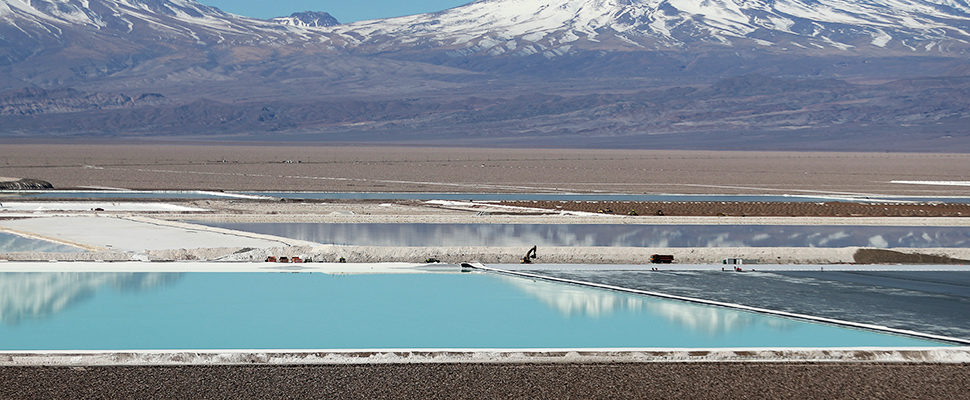Chile seeks to revive stalled lithium project
Chile leads a new effort to boost a local value-added lithium industry, which arouses interest in China, Japan and Europe at a time when global firms seek to ensure the supply of the key component for electric car batteries.

FILE PHOTO: Brine pools of a lithium mine, which belongs to Albemarle Corp, in the Atacama salt flat in the Atacama desert, Chile, August 16, 2018. REUTERS / Ivan Alvarado
Reuters | Dave Sherwood y Natalia A. Ramos Miranda
Listen to this article
Leer en español: Chile busca reanimar estancado proyecto de litio
The South American country, the world's second largest lithium producer, has made several presentations abroad to rekindle a stagnant lithium auction process, according to a government listing sent to Reuters.
These "roadshows" have summoned dozens of firms in China, Japanese such as Toshiba and the Russian state nuclear agency Rosatom, attracted by the potential access to the huge deposits of "white gold" in Chile.
A tender scheduled for early 2020 offers a guaranteed supply of discounted lithium in exchange for adding value – such as making parts of batteries – in the country. But excess supply and falling metal prices make the task difficult.
In a first auction in 2018, the three winners, including giant Samsung SDI and Korean steelmaker Posco, subsequently retired.
"I don't see a different result (…) than the previous failed tender," said Jaime Alee, a Chilean lithium consultant who has advised foreign investors in the country, adding that the global trend was for more concentrated supply chains and close to the place of greatest demand.
"In that plane, I don't see the commercial and industrial logic of installing a plant in distant Chile," he added.
Investment and development agencies in Chile travel the world seeking to attract interest to the second round, with stops this year in China, France, Japan and South Korea. Invest Chile officials have assured that the problems of the first process have been resolved.
Prominent investors attended one of the seminars held in Beijing at the end of August, including representatives of the Development Bank of China, the energy TBEA and the chemical Sinochem and Chinalco, according to the list.
Japanese banks and mining companies, the South Korean infrastructure agency abroad, the Belgian Umicore and the French transport conglomerate Bollore also came to the invitation, according to a spokeswoman for Invest Chile in an email to Reuters.
Rosatom told Reuters that "Chile is still considered a potential partner for the implementation of lithium projects and to support local government initiatives aimed at attracting foreign companies to participate in joint projects in this area."
Bollore declined to comment and a Toshiba spokesman said he is "not disclosing information related to the business, including participation in such roadshows, unless an official decision is made."
The Development Bank of China, TBEA, Sinochem, Chinalco and Umicore did not respond to requests for comments from Reuters.
Also read: Chinese trade deputies face off in Washington amid deep differences
Step by step
Chinese interest has grown as the Asian giant increases its production of electric cars, amid an expected demand boom. Last year, Tianqi paid more than 4,000 million dollars to enter the main Chilean producer, SQM.
Chile has half of the world's metal reserves. Both SQM and the American Albemarle, the world's largest producer, pump the coveted product from the brine pools located in the northern Salar de Atacama.
But producers mainly export unrefined lithium, without adding value to the chain that Chile expects will generate additional income for its economy.
Despite interest, the conservative president Sebastián Piñera's government has moderated expectations for this round.
Pablo Terrazas, head of the Chilean development agency Corfo that runs the auction, told lawmakers earlier this month that the offer was perhaps not as seductive as expected.
The fall in lithium prices and Chile's distance from consumer markets increase costs and make it difficult to attract battery manufacturers.
"We cannot force a company that manufactures batteries, force it to be installed in Chile," Terrazas told lawmakers. The process "can still be successful, as it can still fail," he added.
Terrazas said he had taken a new turn to this most recent auction trying to attract firms that manufacture parts for batteries that are used in tools, electric skateboards and storage devices.
"We wanted to sell the most sophisticated battery to BMW or Volkswagen. I think you have to go more slowly," he said.





